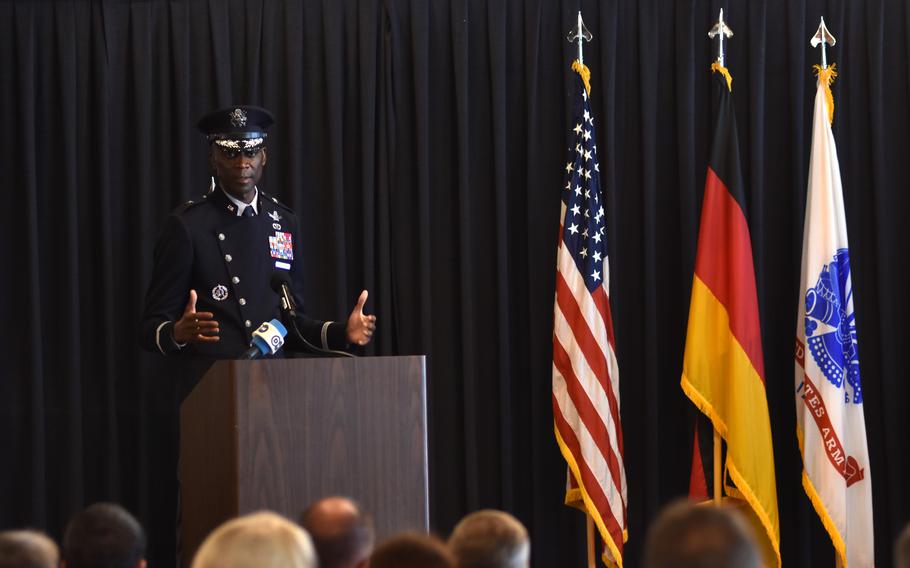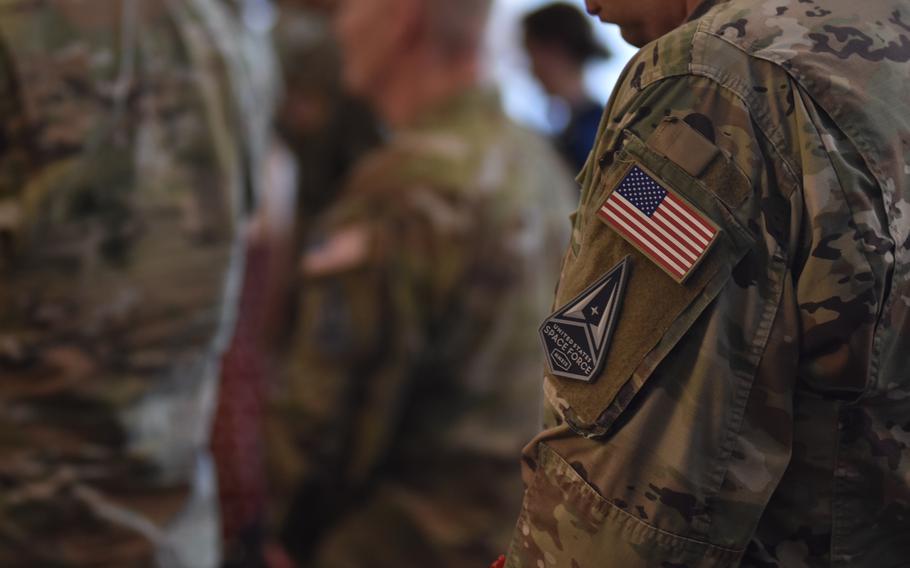
Brig. Gen. Jacob Middleton speaks to guardians and guests after taking command Aug. 13, 2024, of U.S. Space Forces in Europe-Space Forces Africa at Ramstein Air Base, Germany. Middleton is the second commander at the helm since the unit was activated at Ramstein in December 2023. (Jennifer H. Svan/Stars and Stripes)
RAMSTEIN AIR BASE, Germany — Brig. Gen. Jacob Middleton gets asked “all of the time: Why space?”
It’s an apt question for his first day as the commander of U.S. Space Forces in Europe-Space Forces Africa.
“I’d love to be able to say, like ‘Independence Day’ and Will Smith, we’re fighting off aliens,” he said Tuesday the Ramstein Officers Club.
“What I’ll say, if that’s true, I couldn’t tell you anyway, because that’s classified,” he said.
Middleton took over during a ceremony Tuesday for Col. Max Lantz II, who is retiring.
Lantz was the first commander of a unit stood up at Ramstein in December to provide U.S. European and Africa commands with a cadre of experts to facilitate training, information sharing and other activities across some 100 countries.
“You should all be proud knowing you are part of a significant, historic undertaking … those that came first, enabling all that will follow,” Lantz said.
That a one-star general was chosen to step in after Lantz underscores the importance of space power in the region, said Gen. B. Chance Saltzman, the service’s chief of space operations.
A longtime space and missile operations officer, Middleton spent six years in the enlisted ranks before commissioning in 1998.
Middleton said he looks forward to answering “why we’re here and what we do” as he builds on the work led by Lantz.

Gen. B. Chance Saltzman, the chief of space operations for the U.S. Space Force, speaks at a change of command ceremony for U.S. Space Forces in Europe-Space Forces Africa on Aug. 13, 2024, at Ramstein Air Base, Germany. The Space Force component based at Ramstein was activated in December. The command was elevated to a one-star position, with Brig. Gen. Jacob Middleton replacing Col. Max Lantz II, who is retiring. (Jennifer H. Svan/Stars and Stripes)
Saltzman and Gen. Michael Langley, AFRICOM’s commander, did some of that explaining as well in their remarks.
“The guardians here … bring a level of technical expertise to a domain that is rapidly advancing and changing,” Langley said. “We need you now more than ever on this global scene.”
In Africa, the Europe-based guardians helped build a space reconnaissance tracking program that allowed AFRICOM to provide partners with unclassified information through commercial satellite imagery and other means. The data-sharing helped with cross-border violence, disaster relief and illegal fishing, among other problems, Saltzman and Langley said.
“You know what, (China) doesn’t do that,” Langley said. “The Russian Federation doesn’t do that.”
Such initiatives foster U.S. partnerships on the continent, he said. In Europe, the unit enhanced cooperation with NATO and supported Ukraine’s defense against Russia, among other work.
“Take this command to new heights, or I should say, a new orbit,” Langley said.

Guardians display their U.S. Space Force patches during a change of command ceremony Aug. 13, 2024, at Ramstein Air Base, Germany. (Jennifer H. Svan/Stars and Stripes)